NT intervention ‘failed, exaggerated Indigenous child abuse claims’, Alexis Wright argues in new book Praiseworthy
Aboriginal writer Alexis Wright’s epic new book argues the forces behind the intervention of grossly exaggerating paedophilia in remote Indigenous communities.
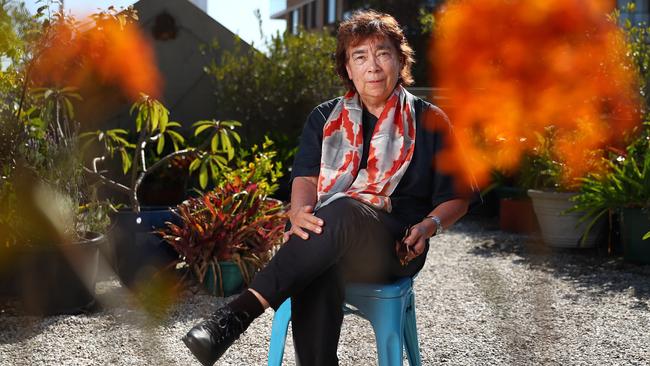
It’s part of literary lore that every major Australian publisher rejected Carpentaria, Alexis Wright’s convention-shredding blockbuster, before the tiny independent press, Giramondo, championed and released the novel in 2006. An epic melange of myth and surrealism, politics and farce set in Queensland’s remote Gulf Country where Wright’s ancestors lived, Carpentaria would go on to win the country’s most prestigious literary prize, the Miles Franklin Award, and a slew of other honours including Queensland and Victorian Premiers’ Literary Awards and the Australian Literature Society’s Gold Medal.
Through her novel, which portrays feuding Indigenous clans from the evocatively named Desperance and their tensions with “uptown” whites and a mining company, the Waanyi woman inscribed her name in the history books. When she won the 2007 Miles Franklin, Wright became the first Indigenous writer to claim the prize in her own right (in 2000 Aboriginal writer Kim Scott shared the award with Thea Astley; Scott also won in 2011).
What is less known about the Carpentaria saga is that the author born and raised in Cloncurry, 120km east of Mount Isa, felt so discouraged by publishers’ knock-backs, she contemplated destroying the manuscript she had sweated over for years. In a candid interview with Review, she says: “I thought at the time that it might be a good idea to press delete on the manuscript and be done with it. Or that I could send it to the Carpentaria Land Council that I belonged to, and they could archive it with everything else.’’
Wright makes this dramatic revelation with a directness that seems at odds with her quiet, measured way of speaking. The writer knew her second novel – which critics described as “uncompromisingly ambitious” and a “genius epic’’ – “would be challenging for a lot of publishers. It was in a time when literature as well as everything else was kind of being dumbed down. It (the rejection) was a bit disappointing, of course. I’m also realistic (about publishing) and I understand a lot of things – well, I try to.’’ A small, rueful chuckle registers – just – down the phone line from her Melbourne home, which she shares with her husband, Anatoly Sawenko (whom she calls “Toly”) and younger daughter Lily.
These days, any new book by Wright is considered a significant publishing event. Fellow Indigenous author and Miles Franklin winner Tara June Winch says of this once-spurned writer: “We call to mind Alexis Wright when they talk about our country’s great literary voice.’’
Wright’s long-time publisher, Giramondo’s Ivor Indyk, says: “Alexis has an almost legendary status in Australia. She’s sold many, many tens of thousands of books. I don’t know of any other writer (in Australia) who’s operating on that (epic) scale. There is that huge time dimension of Indigenous occupation of Australia; that large temporal dimension.’’
He also notes how her prose “bursts out’’ beyond the limits of conventional grammar and syntax and is shot through with irreverent humour. Her audaciously experimental style has also been described as “the novelistic equivalent of LSD’’.
Today, Wright unveils another monumental novel: the 727-page Praiseworthy, which took her 10 years to write (it was juggled with other jobs including Tracker, her Stella-Prize winning “collective memoir” of late Indigenous leader Tracker Tilmouth, and a prestigious Melbourne University professorship).
“In moments I could write and spend time on Praiseworthy I did, but it’s always difficult to write when you’re just grabbing time,’’ says the author.
The 72-year-old, who had a “rudimentary” school education in outback Queensland in the 1950s and 60s, reflects on the self-discipline and deep thinking needed to turn out another epic work: “I like to challenge myself. I think I’ve been challenged all through my life. You put your heart and soul into what you’re doing and hopefully it’ll all work out in the end. It’s a hell of a lot to try and make the whole thing work.’’
Like Carpentaria, Wright’s new novel is set in a remote community – the titular Praiseworthy – in Australia’s north, weaves in and out of real, imaginary and Aboriginal mythical worlds, and is a caustic satire as well as a cautionary tale about youth suicide and climate change. Sixteen years ago, Wright’s Miles Franklin victory was confirmed on the same day the Howard Government announced its emergency intervention into Northern Territory Indigenous communities – and Praiseworthy is a stinging critique of that policy.
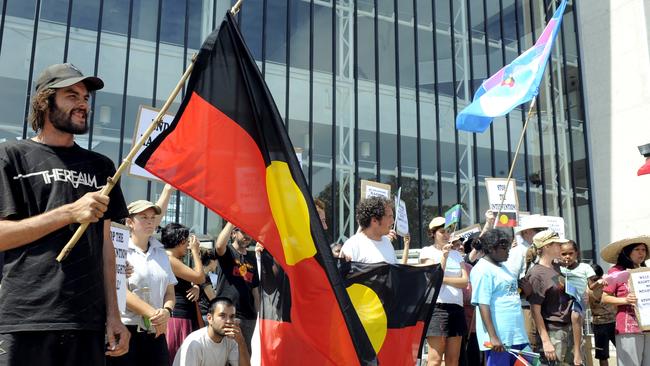
Wright claims those driving the intervention created negative stereotypes of remote Indigenous communities while over-promising and underdelivering. “There are longstanding, overarching issues of major and serious concern in the Aboriginal world,’’ she says. “These issues have been there for a long time. Clearly, the intervention did not fulfil its claims to address these matters. It failed to live up to its claims. A great deal of money was spent on the intervention that should have been spent to approve services strengthening Aboriginal governance – the long-known, well-researched and ignored Aboriginal-defined solutions.’’
More specifically, Praiseworthy accuses forces behind the intervention of grossly exaggerating child abuse problems in remote Top End communities through the character Tommyhawk, an impressionable and confused Aboriginal boy. Tommyhawk is desperate to be “gone” from his family and Praiseworthy so he can live in Parliament House in Canberra and be “assimilated to the level of being rich white’’. The eight-year-old mistakenly believes he has been adopted into his Aboriginal family as “a kind of stolen generation in reverse’’. Hooked on the virtual world and 24-hour news cycle, he is obsessed by inflated claims of “an infestation” of paedophilia in his community and is determined to be taken away “into the white world before he too was molested’’.
Wright writes that Tommyhawk’s fears of being abused were unsurprising in a child “born into the shrill of a nation constantly yelling at the top of its voice about how to fix up the black problem. … It was easy for him to believe he was living in a typical Aboriginal community plagued by paedophiles and being cared for by misopedists, by children-hating parents …. Hatred was not a strong enough word for how he felt about his parents.’’
Tommyhawk’s anxieties are unfounded yet have devastating consequences for his family – his brother Aboriginal Sovereignty (whose name is bitterly ironic); his eccentric entrepreneur father Widespread and his “unassimilable” mother Dance, who has a magical affinity with butterflies and moths and resorts to searching the internet to see if she can seek repatriation to China.
Wright argues that the intervention defined remote communities in damaging ways that would have been absorbed by young children. “I was concerned about the possible impacts this might have on children who heard what was being said about their parents, about their communities, and how Aboriginal people were seen by mainstream Australia. This was the idea behind a young character like Tommyhawk,’’ she says.
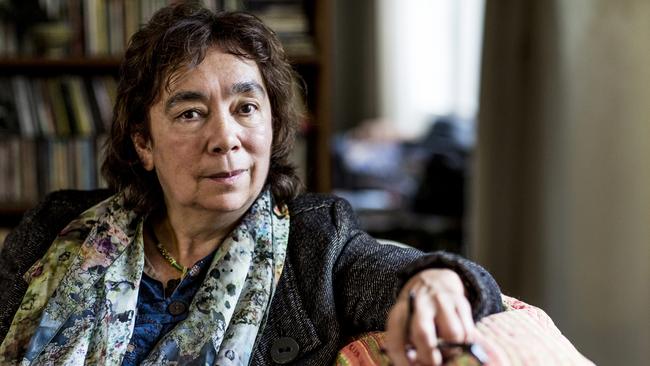
The issue, nonetheless, remains complex. Indigenous children in all states and territories are significantly overrepresented in the child protection system (because of problems including neglect, emotional abuse and physical and sexual abuse). Review asks the author – whose nonfiction book Grog War documented how Tennant Creek’s Indigenous residents campaigned for alcohol restrictions in the 1990s – how she thinks the media should discuss this sensitive issue. She replies: “The media has to act responsibly in its reporting and thoroughly investigate any claims that are made, and avoid sensationalism. The same applies to the authorities dealing with these issues.’’
Praiseworthy has already been sold to American publisher New Directions and British publisher And Other Stories. Barbara Epler, New Directions’ president and publisher, says Wright “washes away the dust on all my everyday notions of what fiction can do. Her voice – with its unique and enormous radiance – is what makes Praiseworthy so splendid and unfathomable … the sweeping overall power to bend time, landscape, and dimensionality – along with the reader’s mind – it all just knocks me out.’’
The novel is also propelled by an anarchic sense of humour: central character Widespread (also known as Planet and Cause Man Steel) is determined to save the planet and Praiseworthy’s Indigenous people by establishing a long-haul transport conglomerate using feral donkeys, while the community’s mayor Ice Pick is so pro-assimilation, his skin and eyes turn white.
Wright has worked as a researcher for Aboriginal organisations in remote Australia, and she says of her novel’s preoccupation with feral donkeys: “When I was living in Central Australia and Northern Australia, I did a lot of travelling over roads and different parts of the bush. I think it’s ingrained in me – what the country is like and hearing the stories. In all the little notebooks that I’ve accumulated over the period of writing this book, there will be something in there somewhere that says, ‘Must write about donkeys’.’’
She laughs. “Because we do have five million feral donkeys. What are we going to do with them except kill them? In terms of the Widespread character, maybe we might have a use for them one day when we run out of petrol.’’
The satire in her novel, she says, “is very much in the style of storytelling in the Aboriginal world’’. She says that for Indigenous people, “the big issues are facing you every day of the week and you’ve got to learn something about how to carry that burden. Tracker would say to me, ‘You’ve gotta laugh or you die’. It’s not making fun of the issues, it’s just to be able to carry the load.’’
Tracker Tilmouth, a former director of the Northern Territory’s Central Land Council and close friend of Wright’s who died in 2015, clearly influenced her portrayal of “culture dreamer” Widespread. In her unconventional memoir of Tilmouth – which won the 2018 Stella Prize – she plaits dozens of often hair-raising stories told by his friends, family, colleagues and the politicians into a 620-page, polyphonic narrative. She worked with him in the Top End, and writes that he once “threatened to roll the car he was driving and kill both of us and our co-worker’’, while they were arguing about how to negotiate Indigenous rights with bad-faith actors. The argument ended when Tracker was distracted by a large taipan and asked the co-worker to try and catch it, so he could give it to his daughter as a pet. According to Wright’s sprawling book, Tracker once tried to drive Queensland Premier Joh Bjelke Petersen off the road in Alice Springs, and claimed the ALP regarded him as a “pet n---er’’. She maintains he was a visionary “both loved and hated” and “a statesman for dreams that were much bigger and better than the realities he saw around him’’.
Despite her outspoken views on the intervention, Wright is in other ways a cautious interview subject – she is reluctant to buy into The Voice debate, saying: “I will probably write something about this in time.’’ She supports any reform “that allows people to control their destiny’’, and recalls how she co-ordinated two Northern Territory constitutional conventions for Indigenous people in 1993 and 1998.
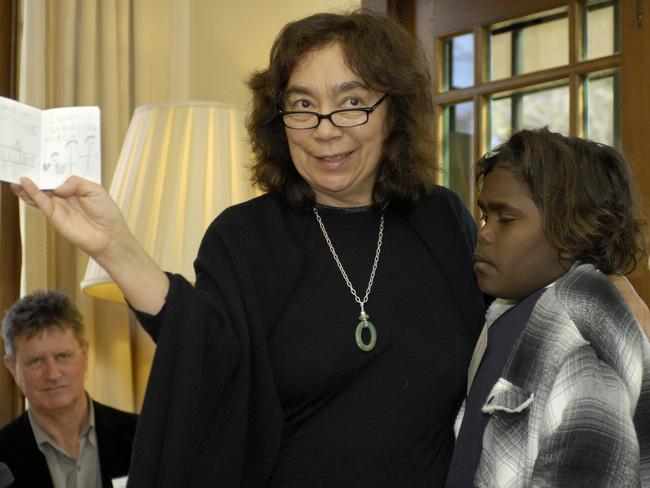
Those conventions were each attended by 1000 Aboriginal people from communities across Central Australia and canvassed a broad sweep of issues affecting their lives, from social and legal matters to treaty demands. Wright argues such events should be held “more frequently, so people actually articulate what they would like to see for their future’’.
However, she baulks at a question about whether The Voice will lead to tangible change in Indigenous people’s lives, replying testily: “I’m not going to talk about that because like I said, I’m thinking about that, and there’s a lot of commentators out there at the moment and I’m not one of them.’’
A perpetual haze hovers over Wright’s fictional coastal town, Praiseworthy, and portends environmental disaster. Climate change was also a central concern of her dystopian 2013 novel, The Swan Book, and she has said previously that climate change fiction can influence public debate. “We need big, epical stories of our times and to try to understand what’s going on and to talk about those (issues),’’ she says, adding that climate issues were “building up” in Australia long before the black summer bushfires.
The writer held Melbourne University’s Boisbouvier chair in Australian literature for almost five years (2017-22), succeeding Man Booker Prize winner Richard Flanagan in this influential role. It is the nation’s only Australian Literature chair reserved for working writers, and Wright says we need more professorships solely dedicated to our own literature (there are currently two): “There obviously needs to be more. I mean, what sort of country are we if we don’t care enough about (homegrown) literature? It’s so important to be able to read and read well and have the material available.”
She found the professorship rewarding if demanding: she fielded up to 350 requests a year from around the country and gave presentations at universities in Europe and China – a country that has a powerful personal resonance for her. Her great-grandfather was Chinese, and she once found a photo of him in the national archives. “You never know what might pop up. It’s a really valuable thing; an amazing thing to have, it really is,’’ she says of the archives, which until recently, faced a serious funding crisis.

She speculates that like other Chinese immigrants, her great grandfather came to Australia in the 1890s and headed to the goldfields. “We think he came through Darwin and probably took that walk all the way over to the Gulf of Carpentaria … It was in the Gulf of Carpentaria that he met my (Aboriginal) great-grandmother and they had children and he went back to China, apparently, and at different times he took three of the children back to China.’’
Wright’s mother and grandmother raised her after her father, a white cattleman who “did it tough”, died when she was five. Her father’s family owned a cattle station but “I never visited any of them. I don’t have any connection there at all. With my father I did. People who remember him have told me throughout my life he was a good person.’’
Her Cloncurry birthplace is roughly 200km from her Indigenous family’s traditional Gulf of Carpentaria homelands. She went to school in the town and “there were really low expectations that we wouldn’t amount to much in our lives. I always credit my grandmother and a lot of elders who’ve taken me under their wing at different times in my life (with her professional success)’’. This included a time “when I was young and hot-headed’’.
Her grandmother and mother expected “we would work hard’’ and take up “the fight that they needed for some of the issues they were confronting’’. She studied sociology, media and creative writing at university and worked in administrative and research roles for Indigenous organisations before she published her first novel, Plains of Promise, in 1997.
She thanks her husband Toly, “always my rock” in the acknowledgments of Praiseworthy but refuses to talk about him further – a result, perhaps of a Guardian UK journalist making ridiculous criticisms of her for advocating for self-determination while being married to a white man. While she was writing the new novel, younger daughter Lily brought cups of tea to her study and “listened with great enthusiasm to … impromptu readings of lines being written’’. She considers herself “very lucky” to have close relationships with both her daughters.
There have been big changes on the literary scene since Wright struggled to have Carpentaria published. The coterie of Indigenous novelists winning prestigious prizes and attaining high-profile publishing deals is expanding, and includes Winch, Tony Birch, Scott and Melissa Lucashenko.
“It was always difficult for an Indigenous writer to be published or have their work recognised, but that has changed dramatically,’’ reflects Wright. “There are too many people to mention – authors who are doing really well, and it’s fantastic. It’s changed, yeah,’’ says this understated woman who likes to work on an operatic scale.
Praiseworthyby Alexis Wright, Giramondo Publishing, $39.95, is released on Saturday.


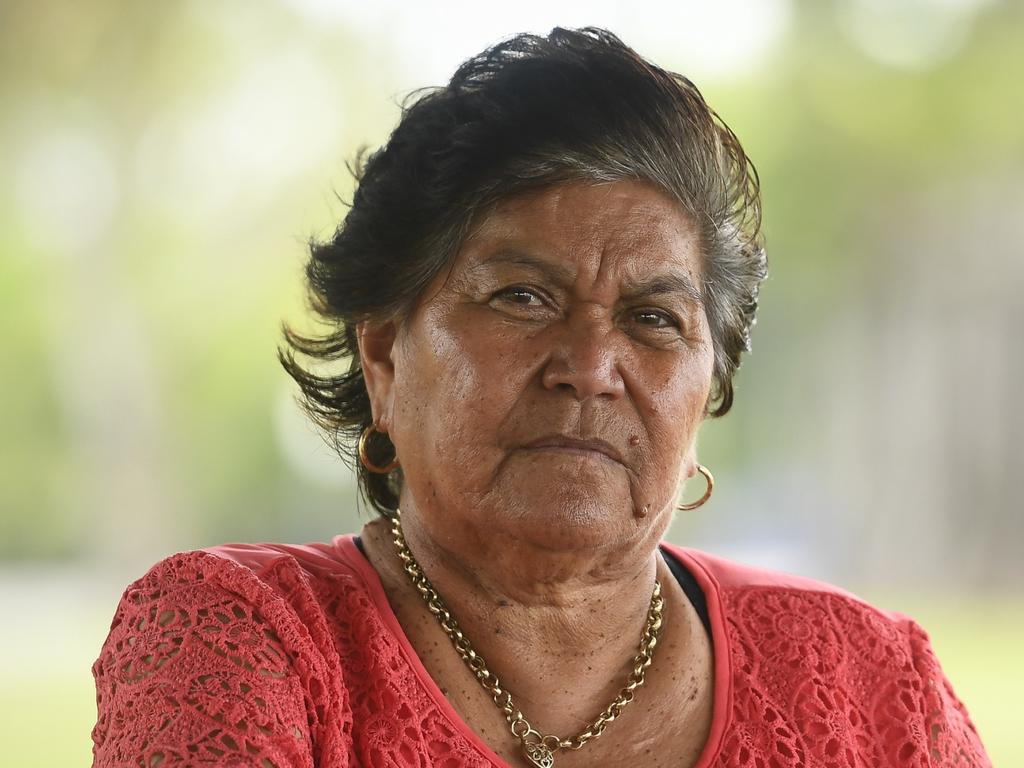
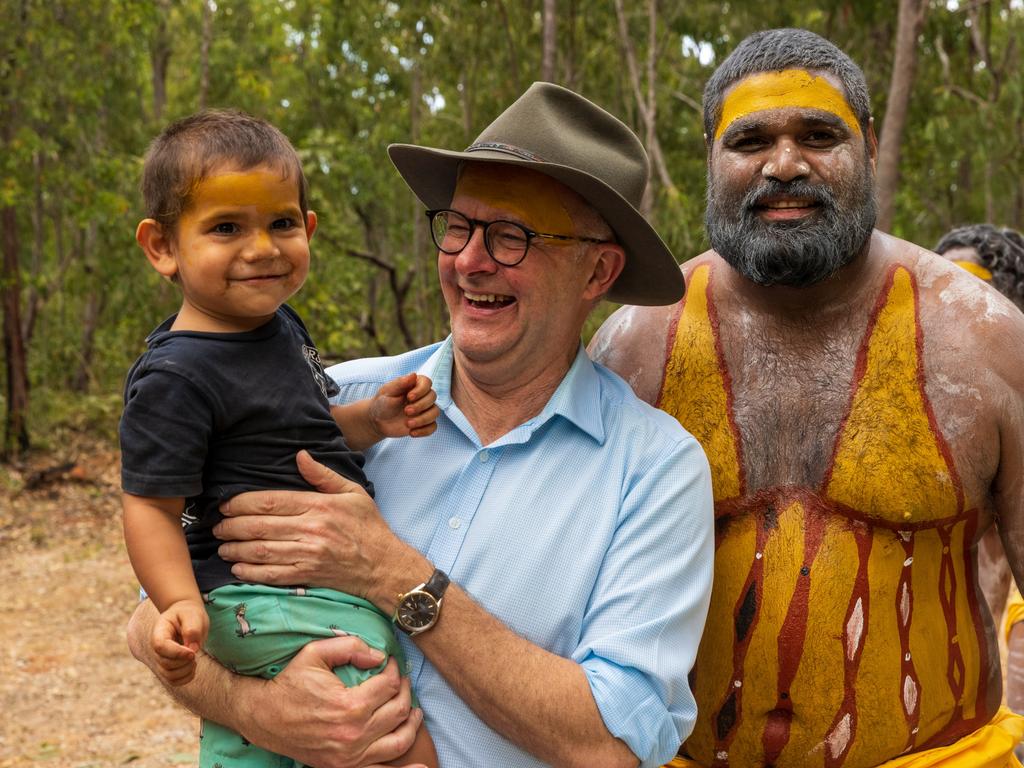


To join the conversation, please log in. Don't have an account? Register
Join the conversation, you are commenting as Logout